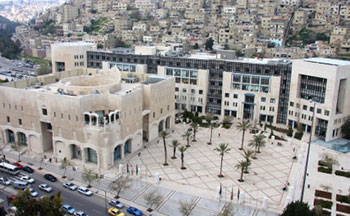 Department of Statistics
Department of Statistics
Department of Statistics
General Information
The Department of Statistics was established in the late 1949 with a limited mandate and humbled number of staff. Since that date, the department was governed by the public statistics law No. 24 of 1950 and amendments thereof.
Whereas numbers are of utter importance; serving as the basis for reference to policy makers, planners, and researchers alike, the department had started as early as the fifties to furnish primary data on natural, economic, and human constructs, in order to measure demographics and take stock of the capabilities and resources available to the Kingdom.
In the sixties, DOS continued to establish the chronology of statistical data. Such data were relied on in setting the seven-year plan of the socio-economic development in Jordan (1964 -1971).
In the seventies, DOS had shifted its focus to agricultural, industrial, labour force and population and housing censuses, as well as several other sampled surveys which included household, demographic, social, and economic fields.
In the eighties, DOS was determined to implement a policy of inclusive coverage of most social and economic phenomena. This effort included conducting several types of agricultural surveys, disability surveys, as well as returning and internal migrations. This decade had also witnessed a significant advancement in economic statistics; following internationally recognized principles and standards as issued by the UN and other international organizations.
The Nineties decade was characterized of the advancement in IT systems and technology, which significantly reduced the efforts involved in obtaining, analysis, and leveraging statistical information towards policy drafting and informed decision-making, in addition to continuous research in the various areas of science. Furthermore, descriptive statistical analysis had emerged as the centre of attention, inspired by the Department’s believe that furnishing rigid numbers conveys no concrete messages.
The Department of Statistics carries out the following tasks:
- Print out hundreds of copies of each statistical bulletin and distribute it free of charge to ministries, governmental departments and institutions, universities, scientific research institutes, and statistical agencies in Arab and foreign countries and at the level of United Nations agencies.
- Provide university professors, students and researchers with copies of statistical bulletins in several forms: CDs, Diskettes, CD-ROM or special computer tabs.
- Provide statistical data on demand to private sector institutions, individuals and embassies in Jordan.
- Allow any data seeker to use reference data and publications stored at the Department’s library.
- Providing information to seekers utilizing any available means (telephone, fax, e-mail and Internet).
- Communicate with data users to find out their statistical information needs and try to meet such needs, in light of available capabilities. In addition to receiving feedback with a view to improve and develop statistical work within the Department.
Public Statistics Law
The Department of Statistics exercises its functions and responsibilities under Law No. 24 of 1950 and its amendments. The law had determined the functions of the Department in collecting, coordinating, analysing, and publishing statistical data in various demographic, social, and economic fields, as well as conducting public censuses in areas of population, housing, agriculture, industry and others.
The aforementioned law had entrusted the Department with express powers and privileges, which entitle the Department’s staff to collect different types of statistics; including access to records and accounts of institutions and companies of various nature.
The law also limits the right to collect statistical information in the Department of Statistics; prohibiting other entities, whether governmental or non-governmental, to collect or publish statistical information, except with prior approval of the Director General of DOS.
Several passages within the respective law expressly provides for the necessity of cooperation from governmental entities, private enterprises, and individuals with the Department and to provide it, within a specified period, the data and information required in a correct and true manner, subject to punishment otherwise.
The law requires relevant entities to furnish true and correct data to the Department, as the law unequivocally stipulates so. The Law provides that all individually furnished data and information shall be treated confidentially, and no public entity, private entity, or individual may access or informed partially of, or use the data for any purpose whatsoever, other than statistical tables.
International cooperation
The Department of Statistics is closely tied with the statistical offices, bodies and institutions, both on the Arab, regional, and international levels, and is always assiduous to improve and develop such relations towards better statistical work in general. These include: the Arab League, the United Nations with its specialized agencies, the United States Agency for International Development (USAID), the German Agency for Development (GTZ), the Japan International Development Agency (JICA), the Applied Social Sciences Institute (FAFO), and the World Bank to name a few.
Censuses and surveys conducted by the Department
- Censuses: at irregular intervals, the Department conducts censuses in the area of population and housing, agriculture, industry, and establishments; to the extent allowed by the financial situation.
- Annual surveys: The Department carries out annual sampled surveys in various areas, such as demographics, household, agricultural, economic and environmental.
- Quarterly surveys: The Department perform a number of quarterly sampled surveys on employment and unemployment, industry, internal trade, construction, transportation, services, the agricultural production sector, and the livestock sector.
- Monthly surveys: The department conducts several monthly surveys such as: agricultural prices, consumer price index, and prices of industrial production quantities.
- Periodic surveys: The Department conducts sampled surveys in the field of household income and expenses, including family health and fertility rates.
Contact Information
- Address
- Amman Jubaiha, next to the Ministry of Higher Education Yajouz Street, next to the Human Resources Development Center
- Telephone
- (962) 6 530 0700
- ZIP Code
- 11181
- Website
- http://www.dos.gov.jo
- Fax
- (962) 6 530 0710





